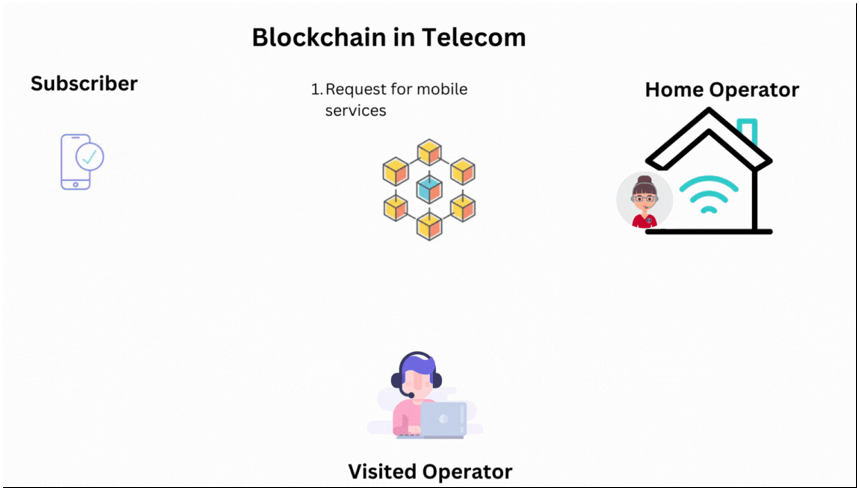Role of blockchain in Telecommunication industry
The blockchain is significant as a transformative technology trend with the potential to revolutionize industries. It functions as a decentralized, immutable, secure, and transparent database, utilizing cryptography to link transactions in a sequence. This innovation could disrupt existing business models by eliminating intermediaries, boosting efficiency, and unlocking new revenue streams. In essence, blockchain has the capacity to enhance profitability for businesses across various sectors by increasing income and reducing expenses.
In our increasingly interconnected world, communication infrastructure has become the backbone of the global economy. Whether you’re a small business owner, a large multinational corporation, or an individual, our lives have become deeply reliant on the ability to communicate seamlessly worldwide. Blockchain technology has made a profound impact on the telecom industry, particularly in the realm of fraud prevention. Telecom fraud, encompassing issues like identity theft, unauthorized call rerouting, and fraudulent billing, imposes substantial financial losses on the industry annually. The Blockchain in Telecom industry is expected to experience significant growth, reaching a projected value of USD 5.79 billion by 2028, with a CAGR of 55.13% from 2023 to 2028.
What are Use cases of blockchain in telecom?
Blockchain technology has introduced set of transformative elements that bring about positive changes in the telecom sector.
| Identity Management | Due to Blockchain technology for the telecom sector involves the secure and transparent management of user identities and their associated information on the blockchain. It provides users with more control over their personal data and ensures its integrity. This can prevent fraud, enhance user privacy, and streamline identity verification processes, all while maintaining data security through blockchain’s decentralized and tamper-resistant nature.
|
| IOT (Internet of Things) | These devices with blockchain technology to create a secure and efficient ecosystem for managing and exchanging data generated by these devices.
|
| Roaming | Telecom uses blockchain that improves international mobile services with transparent billing, faster settlements via smart contracts, enhanced security, and a better customer experience. It reduces costs and enhances the efficiency of roaming services for both providers and customers.
|
| Digital Wallets | It provides secure and convenient solutions for mobile payments, subscription management, and identity verification. These wallets enhance user experience by enabling seamless transactions, reducing fraud, and offering decentralized control over personal data and finances.
|
| Internal Operations | Blockchain in telecom streamlines OSS/BSS (Operational Support Systems/Business Support Systems) processes by ensuring secure and transparent management of customer data, billing, and network operations.
|
| Resource sharing | It allows network resources, such as bandwidth, to be shared securely among operators, Smart contracts facilitate automated resource allocation and billing, enhancing collaboration and profitability within the telecom sector.
|
| Smart Connection | Blockchain’s trust and data integrity promote seamless integration of various smart city components, fostering urban development.
|
| Compliance | The transparent and tamper-resistant ledger of blockchain helps in identifying and mitigating fraudulent activities such as identity theft and billing fraud. |
How blockchain helps the telecom industry?

Blockchain simplifies and secures telecom operations, particularly in roaming services. Subscribers receive network offers when they enter new areas, and blockchain enables them to choose and request services from their home operator. Smart contracts govern the payment process, ensuring transparency and trust. Home operators deposit funds into the smart contract for service payment. Visitor operators validate and report on services, triggering payment release once confirmed. This system streamlines roaming, enhancing payment efficiency and inter-operator trust. Implementing this solution requires smart contracts, blockchain clients, consensus engines, and user-friendly mobile apps for direct interactions.
What are the Challenges in Telecommunication Blockchain Adoption?
The adoption of blockchain technology in the telecommunications industry presents several substantial challenges. Integrating blockchain into existing telecom infrastructure is another daunting task, involving complexities and substantial costs, especially when ensuring compatibility with legacy systems. Balancing transparency with privacy is yet another challenge, requiring meticulous attention to safeguarding sensitive data while still benefiting from blockchain’s transparency. Implementing blockchain solutions also comes with substantial upfront and ongoing operational costs, making it a considerable budgetary commitment. Furthermore, there may be a shortage of skilled professionals well-versed in blockchain technology, requiring significant investments in education and training. Ensuring interoperability between diverse blockchain networks and platforms is also pivotal, yet hindered by a lack of standardized protocols. Resistance to change within organizations and addressing the energy-intensive nature of certain blockchain networks round out the complex landscape of challenges facing telecom companies looking to embrace this innovative technology.
Conclusion
In short, blockchain holds the power to transform the telecommunications sector by enhancing connectivity, security, and transaction efficiency. Integration of Blockchain streamlines roaming services, allowing subscribers to choose offers, request services, and automate payment processes through smart contracts, ensuring transparency and trust between operators. This technology offers a promising future for the telecom industry by improving connectivity, security, and efficiency. While challenges exist, real-world successes highlight its potential to bring substantial advantages to telecom firms and consumers